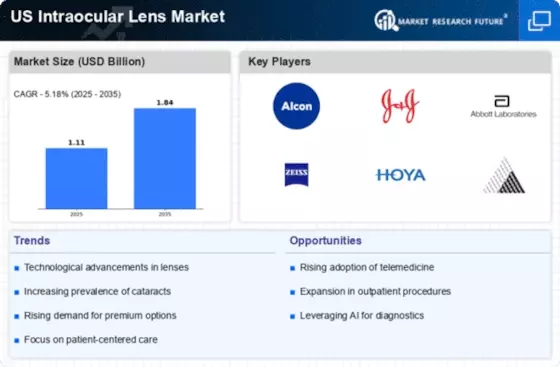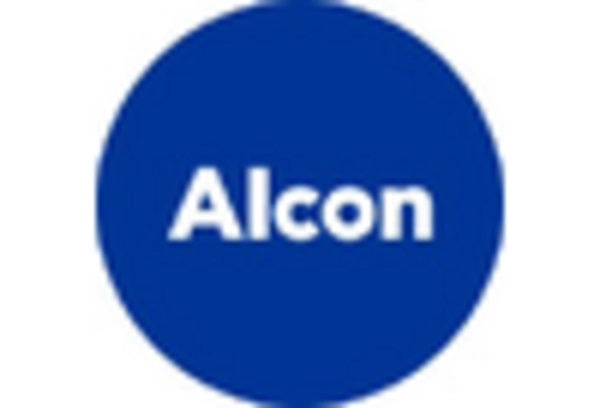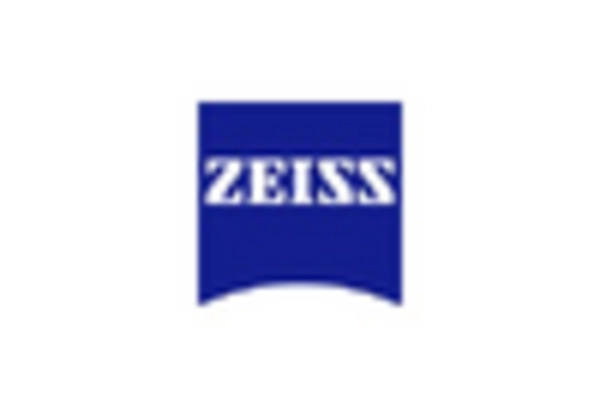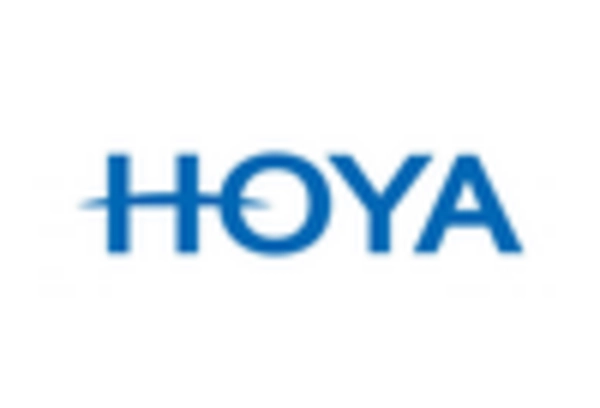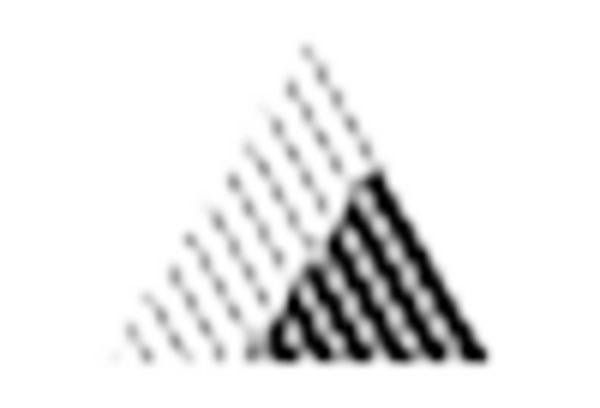Aging Population and Vision Health
The US Intraocular Lens Market is significantly influenced by the aging population, as the prevalence of cataracts and other vision-related ailments increases with age. According to the U.S. Census Bureau, the population aged 65 and older is projected to reach 95 million by 2060, which suggests a growing demand for intraocular lenses. This demographic shift indicates that more individuals will require cataract surgery, thereby driving the need for intraocular lenses. Furthermore, the American Academy of Ophthalmology reports that cataracts affect nearly 24.4 million Americans aged 40 and older, highlighting the urgent need for effective vision correction solutions. As the population ages, the US Intraocular Lens Market is likely to expand, with manufacturers focusing on innovative lens designs to cater to this demographic.
Rising Awareness and Preventive Eye Care
The growing awareness of eye health and preventive care is a key driver for the US Intraocular Lens Market. Public health campaigns and educational initiatives have increased the understanding of cataracts and the importance of regular eye examinations. As more individuals recognize the benefits of early detection and treatment, the demand for intraocular lenses is likely to rise. The National Eye Institute emphasizes the importance of eye health, which has led to an increase in routine eye check-ups. This heightened awareness is expected to contribute to a larger patient base seeking cataract surgery, thereby propelling the growth of the US Intraocular Lens Market. Additionally, the trend towards preventive care aligns with broader healthcare initiatives aimed at improving overall population health.
Competitive Landscape and Market Dynamics
The competitive landscape of the US Intraocular Lens Market is characterized by the presence of several key players, each striving to innovate and capture market share. Major companies are investing in research and development to introduce advanced intraocular lens technologies, such as toric and multifocal lenses, which cater to diverse patient needs. This competitive environment fosters innovation and drives product differentiation, ultimately benefiting consumers. Additionally, strategic partnerships and collaborations among manufacturers, healthcare providers, and research institutions are likely to enhance market dynamics. As companies seek to establish a foothold in the growing market, the US Intraocular Lens Market is expected to witness increased competition, leading to improved product offerings and potentially lower prices for consumers.
Economic Factors and Healthcare Accessibility
Economic conditions and healthcare accessibility are crucial factors influencing the US Intraocular Lens Market. The rising costs of healthcare and the increasing burden of out-of-pocket expenses can impact patients' decisions regarding cataract surgery and lens selection. However, the expansion of insurance coverage for cataract procedures, including intraocular lens implantation, is likely to mitigate some of these financial barriers. The Centers for Medicare & Medicaid Services (CMS) have made strides in covering premium intraocular lenses, which may encourage more patients to opt for advanced lens options. As healthcare policies evolve, the US Intraocular Lens Market may experience growth driven by improved access to surgical procedures and a wider range of lens choices for patients.
Technological Innovations in Surgical Procedures
Advancements in surgical techniques and technologies are reshaping the US Intraocular Lens Market. The introduction of minimally invasive surgical methods, such as phacoemulsification, has enhanced the efficiency and safety of cataract surgeries. These innovations not only improve patient outcomes but also increase the adoption of intraocular lenses. The integration of femtosecond laser technology in cataract surgery has further refined the precision of lens implantation, leading to better visual results. As a result, the market for intraocular lenses is expected to grow, with a projected CAGR of around 5.5% from 2021 to 2028, according to industry estimates. This trend indicates that technological advancements will continue to play a pivotal role in shaping the US Intraocular Lens Market.


